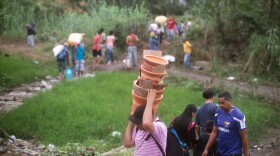
Christina Cala
Christina Cala is a producer for Code Switch. Before that, she was at the TED Radio Hour where she piloted two new episode formats — the curator chat and the long interview. She's also reported on a movement to preserve African American cultural sites in Birmingham and followed youth climate activists in New York City.
Before that, she spent five years producing, reporting and editing for NPR's evening news program, All Things Considered. While at All Things Considered, she reported from the Colombia-Venezuela border on the migration crisis, covered immigration from both sides of the U.S.-Mexico border, told the story of one man moving through the immigration system, field-produced from the Trump-Putin summit in Helsinki and reported her first piece from Puerto Rico after Hurricane Maria. Her reporting on the border was part of a 2019 Edward R. Murrow award-winning package.
In her role with All Things Considered, Cala served as the show's update producer and director, participating in special breaking news coverage. She also led music coverage for the show, reporting and producing from SXSW, editing music reviews and training the next generation of music critics.
In 2018, she co-founded the MGIPOC (Marginalized Gender and Intersex People of Color) Mentorship Program at NPR. The program includes one-on-one mentorship, scholarships for conferences, monthly brown-bags and an annual speaker symposium. She and her co-founders have presented on the program at ONA, Third Coast, Werk It and more. She and her co-founders received the NPR Diversity Success employee award for their work in 2018.
Before coming to NPR, she reported internationally from Lima on the Carnegie Foundation Global Reporting Fellowship, Munich on the Eric Lund Global Reporting and Research grant, and at the Times/Sunday Times Newspaper in Cape Town.
She graduated from Northwestern University with her Bachelor's of Science and Master's of Science in Journalism.
-
The killing of George Floyd by a police officer sparked massive protests nationwide. Writer, teacher, and scholar Clint Smith reflects on that moment through conversation, letters, and poetry.
-
How can we make amends for the atrocities of slavery and segregation? Historian and preservationist Brent Leggs discusses one step in confronting the past: preserving African American historic sites.
-
We're used to thinking of DNA as a rigid blueprint. Karissa Sanbonmatsu researches how our environment affects the way DNA expresses itself—especially when it comes to sex and gender.
-
The human body is not a patchwork of separate systems. It's intricately connected, says neuroscientist Lisa Mosconi. She explains the relationship between our brains, hormones and reproductive organs.
-
An All Things Considered team recently traveled along a common Colombian route taken by Venezuelans fleeing crisis in their country and discovered dramatic stories of an expanding exodus.
-
The definition of what it means to be an independent musician is more complicated than one might think. It comes down to market share, ownership and so much more.
-
Latin artists at SXSW 2019 Festival have traveled from Brazil and Venezuela where speaking out against government officials can be dangerous.
-
Construction on the first new stretch of border wall under the Trump administration is slated to begin this winter. In South Texas, the wall will cut right through a butterfly sanctuary.
-
The Eagles' 1976 compilation album, Their Greatest Hits 1971-1975, has surpassed Michael Jackson's Thriller for the title of best-selling album of all time.
-
The Rio Grande Valley is the busiest stretch of the U.S.-Mexico border for crossing. NPR recently spent time on both sides of the border here, where immigration is part of everyday life.








